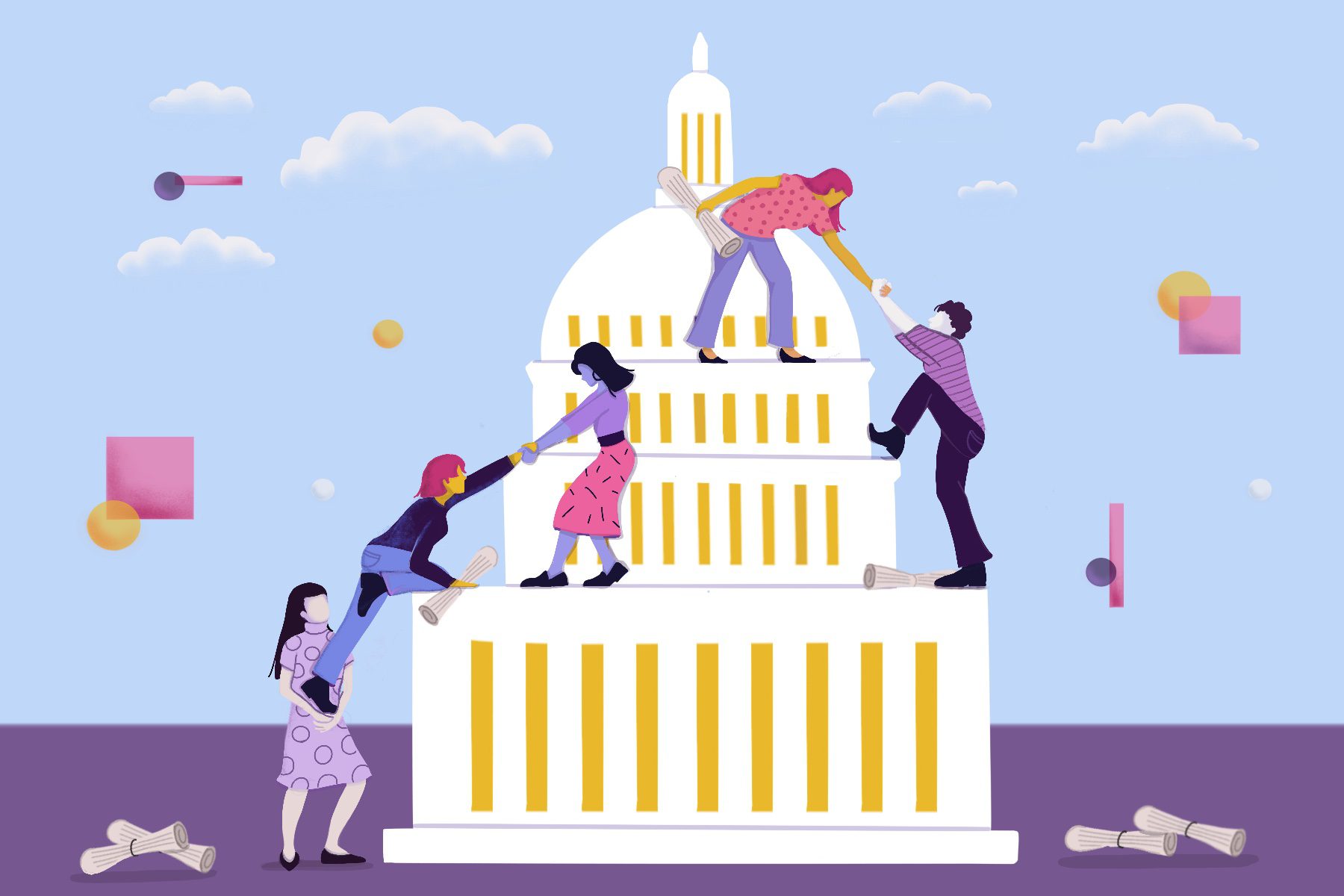Proposed reforms to the way the military handles sexual assault cases, if passed as part of the annual defense bill, would cap off a streak of significant bipartisan measures Congress has passed to combat intimate partner violence and the silencing of workplace sexual harassment survivors.
It’s the culmination of years of lobbying by survivors and advocates to update antiquated laws and overhaul slow-to-change systems. And Congress may be on the verge of fulfilling another tireless, years-long push to overhaul parts of a military justice system that lawmakers and advocates say has failed too many sexual assault survivors.
“We have had a couple of great wins in Congress,” Noreen Farrell, executive director of advocacy group Equal Rights Advocates, told The 19th, calling 2022 a watershed year. “And these are wins that I would say advocates, over decades, would have never thought they could see happen at the federal level.”
Tackling gender-based violence and assault has been an overlooked arena of collaboration between the two parties, even in a period of high legislative productivity. The COVID-19 pandemic fueled intimate partner violence, and sexual harassment has remained pervasive – and all this has contributed to lawmakers tackling these issues across party lines, advocates say.
“I think it’s really remarkable that we’re five years after #MeToo went viral — and the recent legislation passed in Congress and state legislatures shows how strong #MeToo continues to be,” said Andrea Johnson, director of state policy, workplace justice and cross-cutting initiatives at the National Women’s Law Center.
But experts and advocates say the recent legislation passed by Congress still doesn’t go nearly far enough. Women, particularly women of color and those who belong to other marginalized groups, face a heightened risk of intimate partner violence and workplace harassment.
“My main takeaway is that we still have a long way to go,” Nicole Bedera, a sociologist and researcher who studies gender-based violence, told The 19th of the bills passed by Congress. “Even in cases where we know that there is something they could do to intervene on gender-based violence, it’s a much more difficult process than we would hope it would be.”
Legislation against physical harm began rolling in March, when Congress reauthorized the Violence Against Women Act (VAWA) of 1994 after letting the landmark law expire for three years. It ensured continued funding for the law’s anti-violence programs and directed funds toward new initiatives aimed at intimate partner violence in Native American, Alaska Native and LGBTQ+ communities.
The VAWA reauthorization, however, did not fulfill a long-standing demand of gun safety advocates to close the “boyfriend loophole” in gun purchasing. The loophole meant that only those convicted of misdemeanor domestic violence against a current or former spouse, a partner they lived with, or a partner with whom they shared a child were prohibited from purchasing a firearm.
Three months later, spurred by mass shootings in Buffalo, New York, and Uvalde, Texas, Congress passed the Safer Communities Act, a major bipartisan gun safety package that tightened — but did not fully close — the loophole.
The bill, passed in June, expanded the ban on purchasing firearms to those convicted of abusing a partner in a “current or recent former dating relationship.” It still leaves some critical gaps in the legal system that will continue to allow some abusers to buy firearms, experts previously told The 19th.
Organizations like the National Rifle Association have consistently advocated against the existing lifetime gun ownership ban for those convicted of misdemeanor domestic violence against a spouse and the expansion of firearm purchasing bans to broader categories of offenders.
“I find that really dispiriting,” Bedera said. “I find it really frustrating, because this should be something that we universally agree about — which is that if someone is violently harming their intimate partner or their children, that should be a reason you’re not allowed to have a gun.”
The flaws in the system that currently exists to address intimate partner violence go far beyond gun laws, Bedera said. The lack of a clear definition of gender-based violence in federal law and the inadequacy of the criminal justice system to protect many victims who come forward are also larger structural issues in the system that leave survivors falling through the cracks, she said.
Bedera said lawmakers need to recognize that the criminal justice system “is not necessarily safe” for women of color, LGBTQ+ women and undocumented women especially.
“Even victims who do choose that avenue for recourse often will find that it did not give them what they were looking for and only exacerbated their trauma,” she said.
Congress did pass legislation giving survivors additional tools outside of the criminal justice system to leave abusive situations. The bipartisan Safe Connections Act, signed by President Joe Biden last week, makes it easier for people experiencing intimate partner violence to get out of joint phone plans they share with their abusers and directs the Federal Communications Commission to ensure that texts and calls to hotlines don’t show up on customers’ phone records.
“In general, policies that private companies put into place because they’re advantageous for their bottom line and restrict the consumer will often create problems for victims in abusive relationships who are trying to leave,” Bedera noted, calling the bill “encouraging.”
And nearly five years after the #MeToo movement brought the prevalence of workplace sexual assault and harassment into the public eye, state and federal lawmakers have passed dozens of bills reining in the most common tools used to keep such cases in the shadows and silence survivors.
“We’ve seen, over the last five years, 22 states pass workplace anti-harassment legislation,” Johnson said. “That alone is really remarkable.”
Congress made some of those reforms the law of the land in 2022. In February, both chambers passed a bipartisan bill that bans forced arbitration clauses in cases of sexual harassment and assault claims made in workplaces and other settings. And in November, they passed the Speak Out Act, prohibiting the use of nondisclosure agreements (NDAs) in legal settlements over workplace sexual harassment and assault.
Farrell said the revelations of sexual assault committed by former film producer Harvey Weinstein, in particular, shifted the public discussion from whether the victims’ accounts of pervasive sexual misconduct in Hollywood were true to interrogating the systems that enabled repeat offenders like Weinstein. “A key piece of this has been the silencing agreements,” she noted.
Farrell said efforts to limit forced arbitration and NDAs at every level have “really gained momentum in a way that I don’t think anybody who’s represented workers in these cases thought possible.”
Still, Johnson argued that the NDA and forced arbitration bills passed by Congress were too narrow in not covering other kinds of workplace harm, like harassment based on race and sexual orientation, which often go hand-in-hand with sexual harassment.
“Ending forced arbitration is a really big deal. However, it’s striking to me that none of these changes have been enacted in the criminal justice system,” Bedera also said. “We’re still having a really focused version of #MeToo legislation that is going to disproportionately benefit working White women, which isn’t enough.”
Farrell and Johnson said since #MeToo, it’s largely been the states leading the way in cracking down on workplace harassment. Advocates are gearing up to fight for more bipartisan workplace protection legislation in 2023, including in red and purple states.
“A lot of these workplace harassment bills have been passing with bipartisan support, because unfortunately, sexual harassment is a really universal experience,” Johnson noted. She pointed to the Republican-controlled legislature in Georgia, which passed a bill protecting local government workers from retaliation for reporting workplace harassment this year, as an example.
Farrell and Johnson further said laws boosting pay equity and transparency, like new legislation in some states requiring employers to publicize their salary ranges, are also essential to ensuring workplace justice and empowering women to leave unfair work situations.
“What we like to say is, ‘Pay us more and touch us less,’” Farrell said. “It’s not just about the harassment, it is the whole system that values women’s work. When women’s work is valued as it should be, then women have options.”
The work ahead, advocates say, is realizing the full promise of the #MeToo movement. That means changing not just the culture around sexual violence but the systems in place that enable it — and taking the burden off survivors to leave unsafe situations fully on their own.
Bedera said lawmakers should act from a framework of making it easiest for a survivor to leave an abusive relationship or an employee to get out of a hostile workplace. “We always expect the victims to take on huge sacrifices to be able to leave,” she said.
“It’s not fair to tell victims that because someone has chosen to act violently toward them that they must uproot their entire life and start over,” she added. “But that is still the premise that we’re operating under.”







